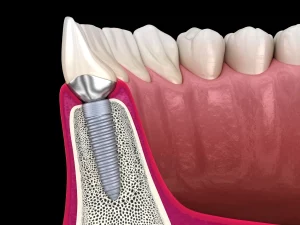
Dental implant surgery is an effective procedure that can significantly improve the quality of life affected by tooth loss, helping patients regain a confident smile. It not only restores chewing function but also enhances the overall aesthetics of the oral cavity. However, this surgery is a significant medical procedure, and thorough pre-surgical preparation is crucial for its success and a smooth recovery. This article will briefly outline the benefits of dental implants and explore essential pre-surgery preparation steps, including dietary guidelines, to ensure that every patient approaches the procedure in optimal condition, minimizing potential risks and discomfort.
How to Prepare for Dental Implant Surgery?
Dental implant surgery is a complex but highly effective dental restoration procedure that helps patients restore tooth function and enhance oral aesthetics. To ensure the success of the surgery and a smooth recovery, patients need to undergo a series of pre-surgical preparations. Below are the detailed steps on how to prepare for dental implant surgery:
1. Consultation and Comprehensive Evaluation
A comprehensive evaluation is the first step in preparing for dental implant surgery. The dentist will perform a thorough dental examination and review the patient’s medical history, including oral health status, past medical history, and current medications. Additionally, X-rays or 3D imaging will be used to assess the patient’s bone structure and the suitability of dental implants.
During the treatment planning discussion, the dentist will explain the surgery process, the expected duration, and recovery timeline. They will also discuss anesthesia options, such as local anesthesia or sedation, and provide estimates of the surgery costs and insurance coverage. For safety, the dentist may conduct health evaluations, including blood tests or other necessary health assessments.
2. Prepare Your Oral Health and Teeth
Before surgery, patients need to ensure that their oral health is in optimal condition. This includes undergoing a thorough dental cleaning to reduce the bacterial load in the mouth. If there are existing dental issues, such as gum disease or cavities, these should be addressed before the surgery.
Additionally, based on the patient’s bone condition, procedures like bone grafting or sinus lifts may be required as pre-surgery treatments. These steps help create a better foundation and conditions for the dental implant procedure.
3. Pre-Surgical Guidelines
Following pre-surgical guidelines is essential to ensure the surgery goes smoothly. Patients should adhere to the dentist’s dietary instructions, especially if sedation is used. Prior to the surgery, patients may need to fast for a period to ensure safety during the procedure.
Patients should also inform the dentist about their current medications so the dentist can make necessary adjustments. If antibiotics or pain relievers are prescribed before the surgery, patients must take them as directed. If sedation is planned, patients should arrange for someone to drive them home after the procedure.
4. Psychological and Emotional Preparation
Dental implant surgery can cause anxiety and stress for some patients. Therefore, psychological and emotional preparation is also important. Patients can discuss with the dentist the option of using sedatives to reduce anxiety and learn relaxation techniques or breathing exercises to help them stay calm.
Setting realistic expectations is equally important. Patients need to understand the healing process and potential post-operative discomfort, and prepare for follow-up appointments and ongoing care.
5. Prepare for Post-Operative Recovery
For a smooth recovery, patients should create a comfortable recovery environment and stock up on soft foods and pain relief supplies. Additionally, it’s helpful to arrange a cozy resting place for after the surgery and prepare a post-operative care kit, which should include ice packs, pain medication, antibiotics, and gauze.
These preparations will make the recovery process more comfortable and manageable. It also ensures that patients have the necessary supplies readily available for use, helping them recover smoothly and effectively after the surgery.
Surgery for Dental Implants
Dental implant surgery is a multi-phase, meticulously planned procedure meant to guarantee durability and long-term success. The specific stages of this trip are as follows:
Stage 1: Initial Consultation
An first appointment with a qualified oral surgeon marks the start of your dental implant adventure. The dentist will do a comprehensive examination of your oral health at this crucial phase, answer questions like “What should I do before dental implant surgery?” and develop a customized treatment plan. This stage establishes a strong basis for safe and well-informed decision-making all along the way.
Stage 2: Pre-Surgical Planning
Detailed planning is the next step after deciding to go forward with dental implants. The dentist will ascertain the precise location, angle, and size of the necessary implant using high-precision dental imaging. The procedure will go as smoothly and accurately as possible thanks to this careful preparation.
Stage 3: Dental Implant Surgery
The dentist will precisely place the dental implant into your jawbone while you are under local or total anesthetic. The process minimizes pain while guaranteeing safety and efficacy by closely adhering to the established treatment plan.
Stage 4: Healing Period
Your gums and jawbone will need time to heal and completely integrate with the implant once it has been placed; this process is called osseointegration. It usually takes a few months to get through this recovery process. Optimal recovery depends on maintaining good dental hygiene and closely adhering to the dentist’s advice.
Stage 5: Abutment Placement
The dentist will affix an abutment (connection) to the implant once the healing process is over and the implant has firmly merged with the bone. Depending on the kind of implant being utilized, this stage can need a little surgery. The finished dental crown has a stable foundation thanks to the abutment.
Stage 6: Dental Crown Placement
The dentist will attach a custom-made dental crown on the abutment in the last step. These crowns restore both function and appearance by being made to resemble the color, size, and form of your original teeth. The successful completion of this phase marks the end of your smile repair adventure.
From the first consultation to the last crown implantation, the full dental implant procedure might take several months. The wait is justified, however, since this well thought out and carried out procedure results in significant improvements to both dental health and attractiveness.
Post-Operative Instructions for Dental Implant Surgery
After dental implant surgery, proper maintenance is essential for both long-term implant durability and effective recovery. Kindly adhere to these crucial post-operative care instructions:
Post-Operative Care
- Surgical Site Care: Extra care and hygiene are needed at the surgical site. To keep the region clean and rinse your mouth gently, use the mouthwash that your dentist has advised. To avoid irritating the surgical site, do not brush directly over it. Avoid using your hands or other things to touch or push the area.
- Pain Management and Medication: Some discomfort and pain are normal after surgery. As instructed by your dentist, take the recommended pain medicine, paying close attention to the dose guidelines. Get in touch with your dentist right once if the discomfort continues or becomes worse.
- Dietary Restrictions: For the first two weeks after surgery, only eat soft foods. Steer clear of crunchy or hard foods like ice cubes, nuts, and bones since they may put pressure on the surgery site and interfere with the healing process.
Follow-Up Appointments Scheduled Check-Ups:
Frequent follow-up appointments are necessary to track recovery and guarantee a good implant integration. To protect your dental health, adhere to the check-up plan your dentist has established. These appointments help detect and treat any issues early.
Conclusion
Dental implant surgery is an exacting and intricate medical process, and its success depends not only on the dentist’s skill but also on the patient’s participation and careful planning. When the complete preparation process is examined, it becomes clear that every step—from the first consultation and pre-operative planning to the actual surgery, post-operative care, and follow-up appointments—is essential to a good result.
Patients must completely comprehend the significance of pre-operative preparation in order to optimize the outcome and success of dental implant surgery. This entails fully comprehending the process, effectively interacting with the dentist to create a customized treatment plan, completing any required medical examinations, taking care of any current oral health concerns, and mentally and emotionally getting ready for the procedure as well as the




